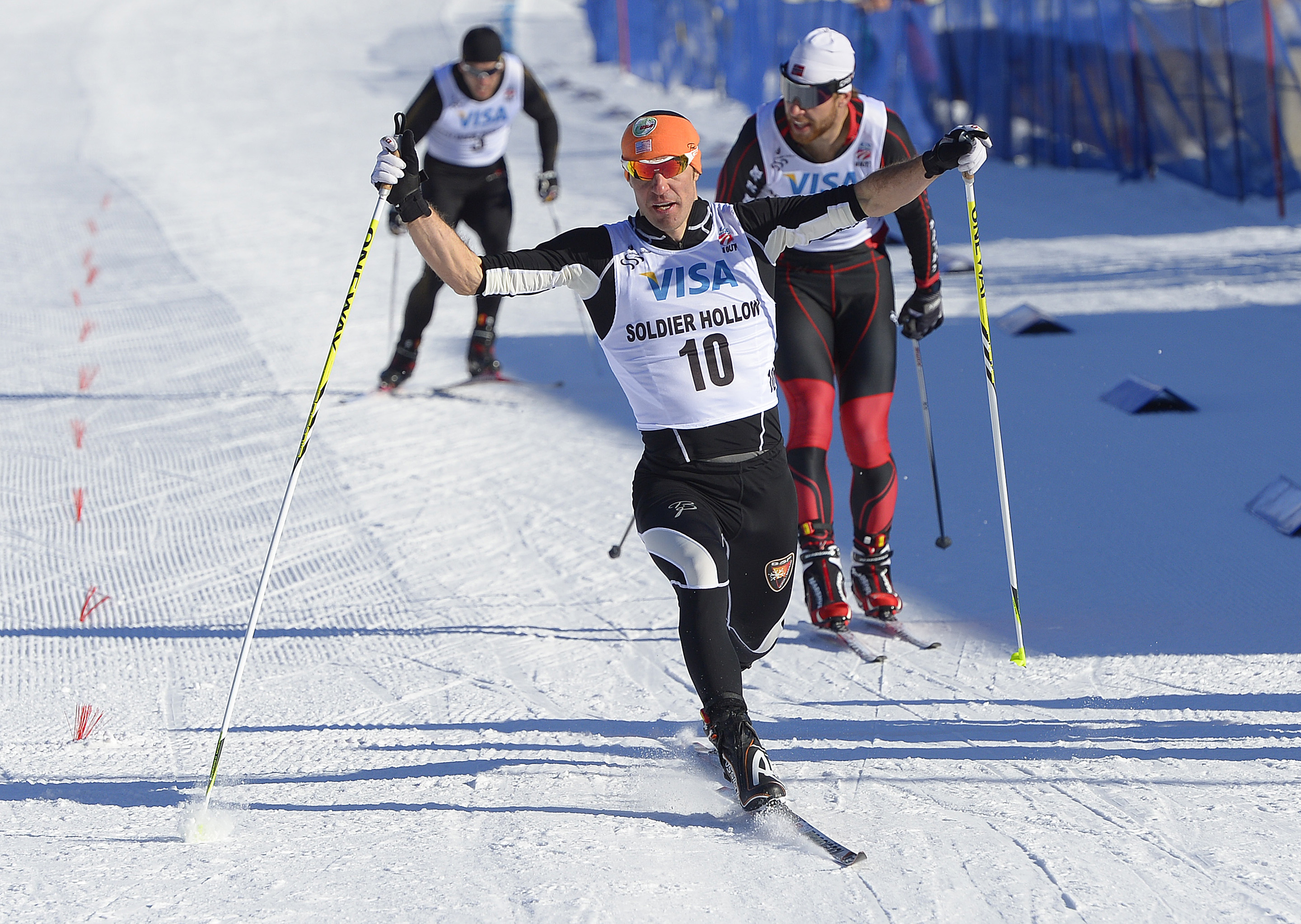
FasterSkier’s coverage of the 2014 U.S. Cross Country Championships is brought to you through the generous support of The Memory Clinic in Bennington, Vt.
MIDWAY, Utah – The men’s field in Sunday’s 1.5-kilometer freestyle sprint at the U.S. Cross Country Championships was anything but shallow. Talents ranging from 2013 national champion Dakota Blackhorse-von Jess to Swedish exchange student Emil Johansson scattered the finals, making it one of the most competitive sprints in recent memory.
Despite the competition, one man came out on top. Torin Koos of the Bridger Ski Foundation (BSF) and Rossignol skied powerfully throughout the finals to take the win over Ben Saxton of Stratton Mountain School (SMS) and Reese Hanneman of Alaska Pacific University (APU).
Rounding out the top six were Jordan Buetow (Bates College), Logan Hanneman (University of Alaska-Fairbanks), and Sam Naney (Methow Olympic Development/Madshus).
There were also some well-known names absent from the A-final. Erik Bjornsen (APU/U.S. Ski Team) got tangled in his quarterfinal before the last sharp corner toward the stadium. Skyler Davis (Stratton Mountain School T2 Team), who was also in that quarterfinal, was unable to capitalize on an early lead and finished fourth in the heat.
“I think we were going three wide and then someone on the right of me kicked my pole and snapped it, pretty high up actually,” Bjornsen said. “When I went to pole on the next stroke I just went down. … It just got a little too tight and I was just trying to hold my position.
“It’s how sprinting goes,” Saturday’s 15 k classic champion added. “Two more races.”
Blackhorse-von Jess (Bend Endurance Academy), who qualified first, crashed in almost the same place as Bjornsen in his semifinal after catching his ski on Koos. Upon getting back up, another skier clipped his ski and he went down again, finishing last in the heat and having to settle for the B-final. There, the defending skate sprint champion won it with a commanding lead.
“After we knew for sure I was going to be in the B-Final coach just said ‘Go bury them,’ ” von Jess explained. “I felt great all day, better and better as the heats went on — I knew I had the feeling and the skis to win and I went for it. Tried to win by as much as I could. Wish I’d had a chance to do it in the A-final, but sometimes that’s racing.”
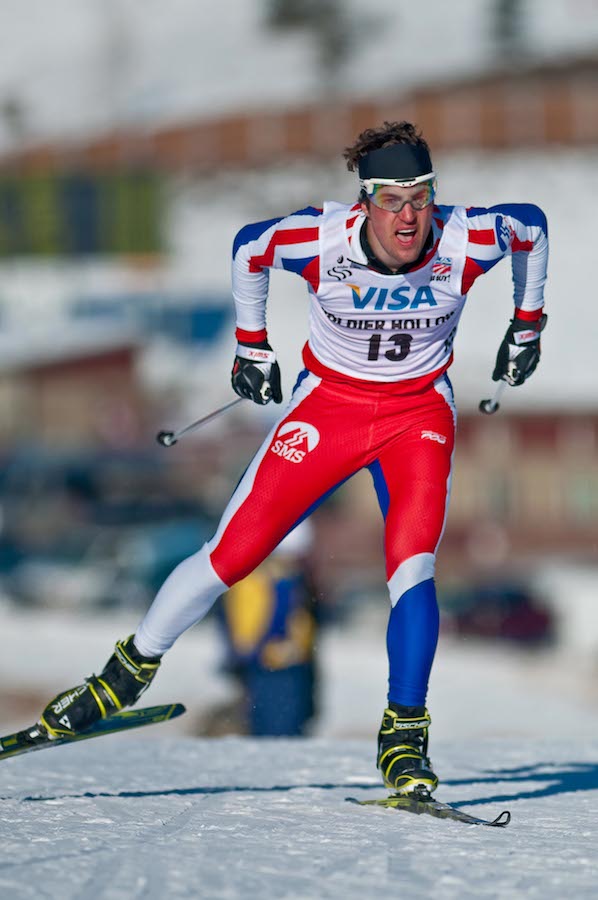
“It’s always great to win in a very solid field,” Koos said in a post-race interview. “The Americans are sprinting at a good level. Ben Saxton was really strong. A lot of guys were fighting the whole time and we were all very close the whole day.”
This marks the eighth national championship for Koos, who is a former U.S. Ski Team member and Olympian. Last year at Soldier Hollow, Koos won the both the classic sprint and the 30 k, but was eliminated from the skate-sprint finals after breaking a ski. This year the 33 year old was looking for redemption, and he found it.
His road to winning wasn’t without challenges. Race organizers decided to change the 2014 course to feature more grueling terrain that made fitness even more important, especially after those in the finals raced four times. The new course was lengthened to roughly 1.5 k and featured a daunting climb up Hermod’s Hill and a steep decent down Whale’s Tail.
“This [course] challenged everything,” Koos said. “I think it is more in the mold of what Sochi is going to be like. I give the organizers a lot of credit for making a change and making a change that worked the first time. They made the course absolutely world class.”
Logan’s older brother Reese couldn’t agree more.
“I think it was fun because no one had any experience on the course before today,” the third-place finisher said. “I was just talking to all the guys and everyone had no clue how to do it. It felt like a totally level playing field.”
Due to the novelty of the course, Koos went into the finals without much of a strategy and decided to see how the rest of the completion fared in order to shape his own style of skiing. Apparently he learned what worked, as he was able to comfortably place in the top two in both his quarterfinal and semifinal.
The final, however, was a different story.
In the A-final, the he made his way up Hermod’s Hill hoping to hop in second behind Hanneman in order to draft on the downhill. However, his competitors had learned from the quarters and semis as well. “Reese had a little bit of a lead and I thought he was going to dip right in like the semifinal, but he just stood up.”
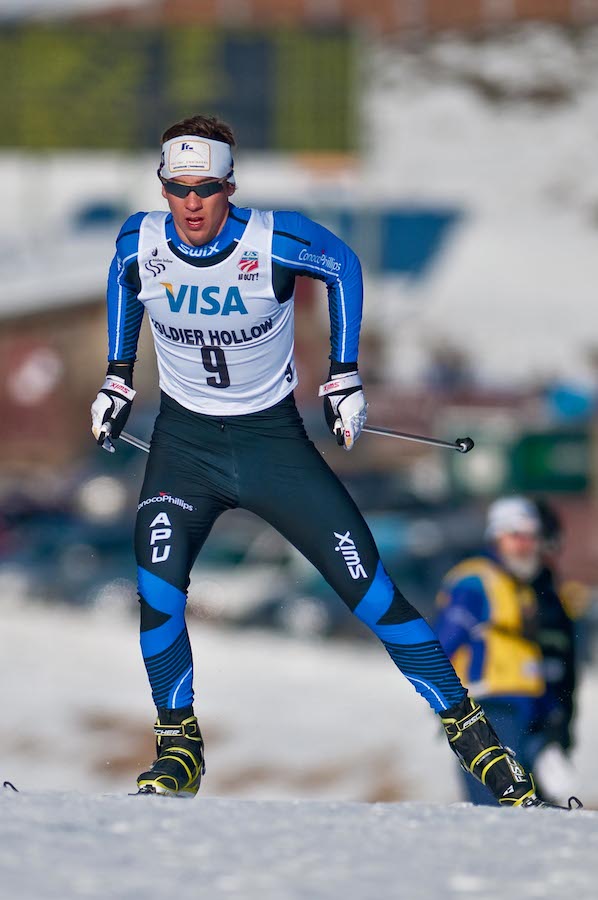
The move was reminiscent to the men’s relay in the 2002 Olympics, which took place at the same venue, where neither Italy’s Cristian Zorzi nor Germany’s Thomas Alsgard wanted to lead the final downhill. In the end, it was Koos who decided to set hesitation aside and go for it.
“I guess I had the least patience of anybody and took it down,” he said jokingly.
Once in front, Koos maintained his lead, a feat that many leaders in the heats had ben unable to uphold. He attributed his ability to stay out front to his strong skating and excellent wax techs. “I think our wax techs really won the day,” he said.
As Koos entered the finish, he had opened up a slight gap of Saxton but he knew that he wasn’t completely safe.
“I could feel Ben coming and I think it was really close,” he said. However, in the end “I really felt that I had it.”
Saxton was ecstatic about his best-ever finish at U.S. nationals a year after placing fifth in the sprint. He attributed his success to his work with SMS head coach Gus Kaeding, who “harped” on him all summer about his double pole starts. In addition, he believed his ability to treat a big day like “just another race” helped propel him to the final.
Fourth place finisher, Buetow was bummed to place just outside of the podium, but was incredibly happy with the day. Logan Hanneman, who placed just behind Buetow, echoed the happy sentiments.
“Today was very good” he said in an interview. “[It’s good to] see I still have it… and my brother’s on the podium for the second day!”
BSF head coach Dragan Danevski was very pleased with Koos’ win. In addition, Jennie Bender, another athlete of the Bridger Ski Foundation, won the national championship on the women’s side.
While Danevski knew both of his athletes had it in them, he said that given the nature of the sport, having two national championships like this was unlikely. “Skiing is not that easy to predict. Especially cross country skiing. Especially sprinting. We were hoping that they would ski at the level of their abilities.”
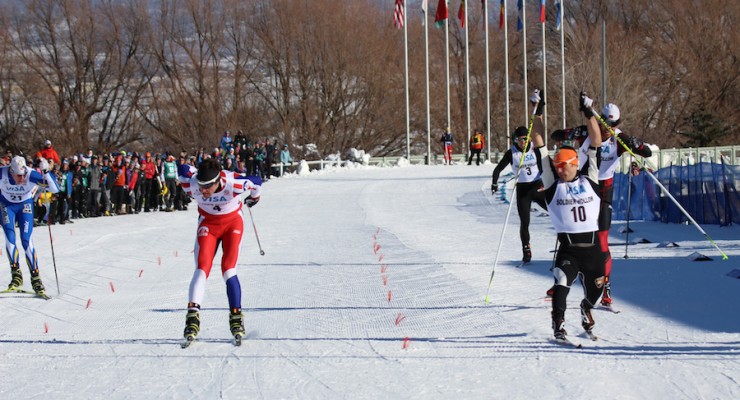
“It’s great working with Dragan and the whole Bridger team,” said Koos. “They’re just really hard workers and [they are] the people behind the sport that help me do what I do. Without those guys, I wouldn’t have won.”
This win means many things for Koos. While he is no stranger to national championships, this year is particularly important for him because of the Olympics in Sochi.
The 2014 Winter Olympics will also feature a freestyle sprint, making this win ever more significant. “I want to be there [Sochi] to represent the U.S.A., join Andy and Simi, make the rounds, and really mix it up.”
When Danevski was asked about Koos’ chance at nabbing a spot on the American Olympic team he believed that Koos is now much closer.
“In three years he has won four national championships in sprinting. None of the other skiers have done that yet,” he said. “He deserves to be in Sochi. I think the best for Torin is coming at the Olympics.”
Whether or not anyone at the 2014 U.S. Cross Country Championships will get a spot at the Olympics remains to be seen. With much of the U.S. criteria resting on discretion and a strong U.S. Ski Team in Europe, it’s hard to say who, if anyone, will be picked from the domestic racing scene to represent America in Sochi.
— Alex Matthews contributed reporting
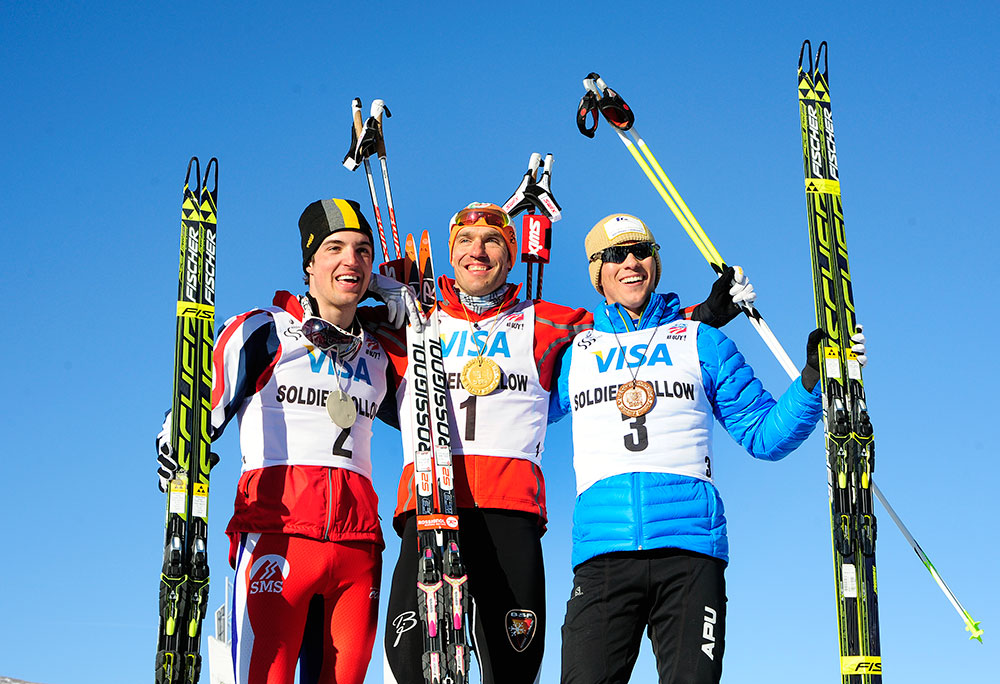
Lander Karath
Lander Karath is FasterSkier's Associate Editor from Bozeman, Montana and a Bridger Ski Foundation alumnus. Between his studies at Middlebury College in Vermont, he is an outdoor enthusiast and a political junkie.







